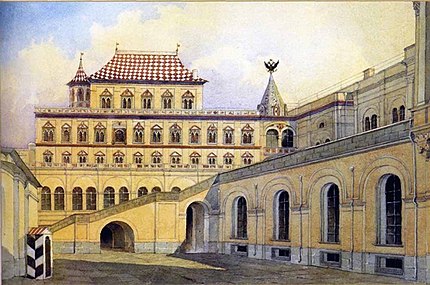Karl Rabus

Karl Wilhelm Rabus, russified as Karl Ivanovich Rabus (Russian: Карл Ива́нович Ра́бус; 11 May 1800, St. Petersburg - 14 January 1857, Moscow) was a Russian architectural painter and art teacher.
Biography
[edit]His father died when Karl was seven. At the age of only ten, he was sent to study at the Imperial Academy of Arts; remaining there until 1821, when he received a small gold medal and a second-degree certificate.[2]
Crimea became one of his favorite places to paint. There, he created the works necessary for him to obtain the title of "Academician" by painting landmarks in a manner that would later become known as en plein aire. He was awarded the title in 1827 for his canvas depicting a villa in Gurzuf, built by the Duc de Richelieu. He also received praise for his view of Balaklava. From Crimea, he went to Odessa, then spent some time in Istanbul.[3]
In 1835, he moved to Moscow and became a teacher of perspective, at the Palace School of Architecture. Later, he taught the same subject at the Konstantinov Land Survey Institute. He also taught a few classes in the theory of colors and art history. Sometimes, he would offer financial support to his most promising students.
A painting of the village church in Ismailovo was presented at court; obtaining him the title of Court Painter. In his later years, he tried his hand at writing; producing "A Guide to Perspective" and beginning a history of art. He also provided commentary on art for several magazines and newspapers.[3] During those years, he taught landscape painting at the Stroganov School and the Moscow School of Painting, Sculpture and Architecture.[2]
Toward the end of his life, he suffered from a type of color blindness (possibly due to glaucoma), that left him unable to distinguish orange and yellow shades.[citation needed] He died after an unspecified long and serious illness.
Selected paintings
[edit]-
View of Moscow in the Times of
Peter the Great -
Transfiguration Church at the
Alexeyevsky Monastery
References
[edit]- ^ Available as reproduced in Gorelov 1958, p. 399.
- ^ a b S. N. Kondakov, Anniversary reference book of the Imperial Academy of Arts. 1764-1914. Vol.2 (1915), St. Petersburg: R. Golike and A. Vilborg Partnership. p.163
- ^ a b A. I. Donchenko, "Rabus, Karl Ivanovich" @ Журнал (Rexstar)
Further reading
[edit]- Ramazanov, Nikolai A. (2014). Belyaev, Nikolai S. (ed.). Материалы для истории художеств в России (PDF) (in Russian). St. Petersburg: Library of the Russian Academy of Sciences. ISBN 978-5-336-00162-4. OCLC 952577337.
- Gorelov, Mikhail I. (1958). "Карл Иванович Рабус". In Leonov, Alexei I. (ed.). Русское искусство: очерки о жизни и творчестве художников. Середина девятнадцатого века (in Russian). Moscow: Iskusstvo. pp. 399–410. OCLC 174704011.
- Petrov, Vladimir A. (2021). "Становление московской школы пейзажа и немецкий романтизм. Карл Рабус" (PDF). Искусствознание (in Russian). No. 4. Moscow: State Institute for Art Studies. pp. 108–179. ISSN 2073-316X.
- Somov, Andrei I. [in Russian] (1899). "Рабус (Карл Иванович)". Brockhaus and Efron Encyclopedic Dictionary (in Russian). Vol. XXVI. St. Petersburg: Brockhaus and Efron. pp. 51–52.
- Stepanova, Svetlana S. [in Russian] (2005). Московское училище живописи и ваяния: Годы становления (in Russian). St. Petersburg: Iskusstvo-SPB. ISBN 5-210-01588-2. OCLC 60540421.
External links
[edit]- Karl Rabus at the Russian Academy of Arts' official website
![]() Media related to Karl Rabus at Wikimedia Commons
Media related to Karl Rabus at Wikimedia Commons
- 1800 births
- 1857 deaths
- Landscape painters from the Russian Empire
- Court painters
- Cityscape artists
- Imperial Academy of Arts alumni
- Artists from Saint Petersburg
- Academic staff of the Moscow School of Painting, Sculpture and Architecture
- Academic staff of Stroganov Moscow State Academy of Arts and Industry
- Burials at Vvedenskoye Cemetery



![Transfiguration Church at the Alexeyevsky Monastery [ru]](http://upload.wikimedia.org/wikipedia/commons/thumb/0/0b/%D0%A0%D0%B0%D0%B1%D1%83%D1%81_%D0%9A%D0%B0%D1%80%D0%BB_%D0%98%D0%B2%D0%B0%D0%BD%D0%BE%D0%B2%D0%B8%D1%87_-_%D0%9F%D1%80%D0%B5%D0%BE%D0%B1%D1%80%D0%B0%D0%B6%D0%B5%D0%BD%D1%81%D0%BA%D0%B0%D1%8F_%D1%86%D0%B5%D1%80%D0%BA%D0%BE%D0%B2%D1%8C_%D0%B2_%D0%90%D0%BB%D0%B5%D0%BA%D1%81%D0%B5%D0%B5%D0%B2%D1%81%D0%BA%D0%BE%D0%BC_%D0%BC%D0%BE%D0%BD%D0%B0%D1%81%D1%82%D1%8B%D1%80%D0%B5_%281838%29.jpg/419px-%D0%A0%D0%B0%D0%B1%D1%83%D1%81_%D0%9A%D0%B0%D1%80%D0%BB_%D0%98%D0%B2%D0%B0%D0%BD%D0%BE%D0%B2%D0%B8%D1%87_-_%D0%9F%D1%80%D0%B5%D0%BE%D0%B1%D1%80%D0%B0%D0%B6%D0%B5%D0%BD%D1%81%D0%BA%D0%B0%D1%8F_%D1%86%D0%B5%D1%80%D0%BA%D0%BE%D0%B2%D1%8C_%D0%B2_%D0%90%D0%BB%D0%B5%D0%BA%D1%81%D0%B5%D0%B5%D0%B2%D1%81%D0%BA%D0%BE%D0%BC_%D0%BC%D0%BE%D0%BD%D0%B0%D1%81%D1%82%D1%8B%D1%80%D0%B5_%281838%29.jpg)
